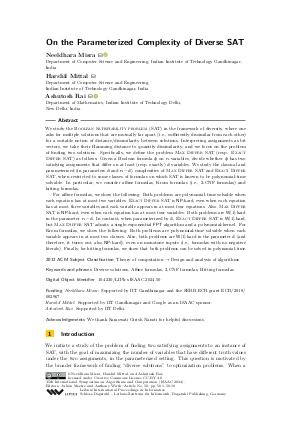LIPIcs.ISAAC.2024.50.pdf
- Filesize: 0.8 MB
- 18 pages

 Creative Commons Attribution 4.0 International license
Creative Commons Attribution 4.0 International license

We study the Boolean Satisfiability problem (SAT) in the framework of diversity, where one asks for multiple solutions that are mutually far apart (i.e., sufficiently dissimilar from each other) for a suitable notion of distance/dissimilarity between solutions. Interpreting assignments as bit vectors, we take their Hamming distance to quantify dissimilarity, and we focus on the problem of finding two solutions. Specifically, we define the problem Max Differ SAT (resp. Exact Differ SAT) as follows: Given a Boolean formula ϕ on n variables, decide whether ϕ has two satisfying assignments that differ on at least (resp. exactly) d variables. We study the classical and parameterized (in parameters d and n-d) complexities of Max Differ SAT and Exact Differ SAT, when restricted to some classes of formulas on which SAT is known to be polynomial-time solvable. In particular, we consider affine formulas, Krom formulas (i.e., 2-CNF formulas) and hitting formulas. For affine formulas, we show the following: Both problems are polynomial-time solvable when each equation has at most two variables. Exact Differ SAT is NP-hard, even when each equation has at most three variables and each variable appears in at most four equations. Also, Max Differ SAT is NP-hard, even when each equation has at most four variables. Both problems are 𝖶[1]-hard in the parameter n-d. In contrast, when parameterized by d, Exact Differ SAT is 𝖶[1]-hard, but Max Differ SAT admits a single-exponential FPT algorithm and a polynomial-kernel. For Krom formulas, we show the following: Both problems are polynomial-time solvable when each variable appears in at most two clauses. Also, both problems are 𝖶[1]-hard in the parameter d (and therefore, it turns out, also NP-hard), even on monotone inputs (i.e., formulas with no negative literals). Finally, for hitting formulas, we show that both problems can be solved in polynomial-time.










Feedback for Dagstuhl Publishing